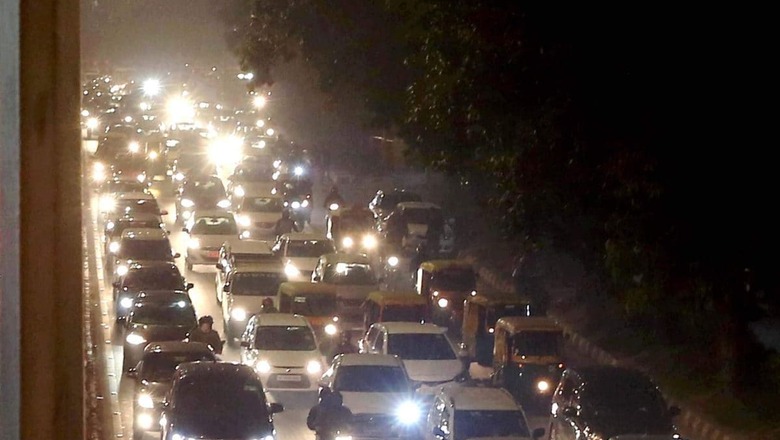
views
The bustling city of Bengaluru, known for its thriving IT industry, has long grappled with severe traffic congestion. To alleviate this perennial issue, the newly formed Congress government in Karnataka has an ambitious plan to find an underground solution for its overground traffic problems. Deputy chief minister DK Shivakumar has been holding meetings with stakeholders and Bengaluru Metropolitan Region Development Authority (BMRDA) to work out a feasible plan that entails the construction of 50 kilometres of tunnels. The initial allocation of the budget is estimated at Rs 22,000 crore for the initial phase.
Deep dive
While the initial estimates for this ambitious project are a staggering Rs 50,000 crore, the envisioned network which is expected to span a total of 99 kilometres aims to enhance connectivity and mitigate traffic bottlenecks in Bengaluru. This comprises three major corridors that crisscross the IT city by connecting the North-South Corridor between Yelahanka and Silk Board Junction, and two East-West Corridors linking KR Puram and Goraguntepalya, Varthur Kodi, and Jnanabharathi. Three more connecting corridors are also proposed for the rest of the city.
Shivakumar believes that the construction of tunnel roads in Bengaluru is viewed as a promising solution to the city’s notorious traffic gridlocks. However, caution is necessary, as feasibility and cost considerations must be carefully evaluated before proceeding with implementation.
The estimated cost of tunnelling stands at around Rs 450 crore per kilometre.
The state government intends to conduct a comprehensive feasibility study for building tunnel roads in congested areas of the city centre, to connect the Kempegowda International Airport (KIA) with the IT corridors.
Past efforts
The proposal to build tunnels across Bengaluru is not a new one.
In 2017 in the first tenure of the Siddarmaiah-led Congress government, a preliminary report prepared by a Bulgarian company laid the foundation for the creation of a tunnel road in Bengaluru. This proposed project, spanning a length of 83 kilometres, was estimated to cost a staggering Rs 25,000 crore and planned to build three corridors across the IT city— a North-South Corridor of around 16 km from Central Silk Board to Hebbal running through the Central Business district, another East-West Corridor from KR Puram to Goraguntepalya, and Jnana Bharathi to Varthur Kodi. These would also be connected through smaller connecting corridors. Despite planning and initial groundwork, the project failed to take off.
The same Congress government had two years earlier announced in 2015 its plans to decongest Bengaluru’s traffic via a tunnel ring road across the city. This proposed corridor aimed to enhance connectivity and alleviate traffic congestion. It included connecting Tumakuru Road with Doddaballapur Road, Ballari Road, Sarjapur Road, and finally converging with Hosur Road. After having a comprehensive feasibility report rendered for the project, it was noted that the project was not unviable.
The Yediyurappa-led BJP government also had a proposal in 2011 where the then Bengaluru development minister R Ashoka proposed a tunnel road. This proposal did not take off as the area that was proposed for the project had already been earmarked for the same stretch of land for an underground metro rail system.
If you go further back in 2007, the Karnataka government led by HD Kumaraswamy had also made an ambitious proposal of constructing a tunnel road that ran alongside the Vidhana Soudha and under the Raj Bhavan: that is from Minsk Square to Sankey Road. This proposal remained in cold storage.
Vision group
Trying to revive his mentor, SM Krishna’s initiative called Bangalore Agenda Task Force (BATF), aimed at beautifying, developing, and decongesting Bengaluru, DK Shivakumar held a meeting with a vision group. This would involve prominent figures and stakeholders like Nandan Nilekani and Narayana Murthy among others. This vision group would also involve Bengaluru legislators and parliamentarians to help frame policies.
“In the coming days, we plan to invite various stakeholders and entrepreneurs to form a Vision Bengaluru team, serving as an advisory group,” he told the media.
Shivakumar also held a round of discussions with officials from AECOM, an international agency specialising in infrastructure design, to explore a range of solutions to decongest Bengaluru. Discussions encompassed not only the construction of tunnel roads but also the prospects of surface roads, elevated roads, and the concept of double-decker tunnel roads.
Missing link
According to officials working closely on this project, the fundamental idea behind the tunnel roads is to seamlessly link the inner roads of Bengaluru with the outer ring roads, thus facilitating smoother and more efficient movement for commuters while simultaneously alleviating congestion.
The government plans to adopt a public-private partnership (PPP) model, partially funding the project through the hybrid annuity model. There is also a proposal to implement toll collections on the tunnels which will help in the recovery of investments.
According to sources, should this plan come to fruition, Bengaluru would be home to one of the most extensive networks of tunnel roads in this part of the world.



















Comments
0 comment